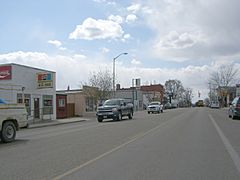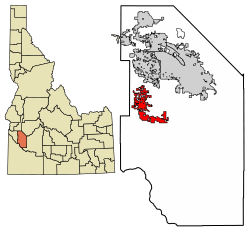Kuna, Idaho facts for kids
Quick facts for kids
Kuna, Idaho
|
||
|---|---|---|

Main Street in Kuna, April 2008
|
||
|
||
| Motto(s):
"Gateway to the Birds of Prey"
|
||

Location of Kuna in Ada County, Idaho
|
||
| Country | United States | |
| State | Idaho | |
| County | Ada | |
| Area | ||
| • Total | 19.88 sq mi (51.49 km2) | |
| • Land | 19.78 sq mi (51.23 km2) | |
| • Water | 0.10 sq mi (0.26 km2) | |
| Elevation | 2,802 ft (854 m) | |
| Population | ||
| • Total | 24,011 | |
| • Density | 1,207.8/sq mi (466.32/km2) | |
| Time zone | UTC−7 (Mountain) | |
| • Summer (DST) | UTC−6 (Mountain) | |
| ZIP code |
83634
|
|
| Area code(s) | 208, 986 | |
| FIPS code | 16-44290 | |
| GNIS feature ID | 2411563 | |
Kuna (pronounced KYOO-nuh) is a city located in Ada County, Idaho. It is part of the larger Boise metropolitan area, which is a big group of cities and towns connected to Boise. In 2020, about 24,011 people lived in Kuna.
Kuna is one of the fastest-growing places in Idaho. Its population almost tripled between 2000 and 2010. It grew by another 60 percent between 2010 and 2020!
Contents
History of Kuna
Kuna started as a stop for trains and coaches going to Boise. Many people believe the name "Kuna" means "the end of the trail." However, some historians say it comes from a Shoshone Indian word meaning "green leaf, good to smoke."
The Western Heritage Historic Byway is a special road that goes past many important historical places in the area. It is recognized as both a state and national scenic route.
Geography and Nature Around Kuna
Kuna's main business area is about 18 miles (29 km) southwest of downtown Boise, which is the capital city of Idaho.
The city covers a total area of about 18.18 square miles (47.09 square kilometers). Most of this area, about 18.08 square miles (46.83 square kilometers), is land. Only a small part, about 0.10 square miles (0.26 square kilometers), is water.
South of Kuna, you can find the Kuna Caves. These are lava tubes, which are like natural tunnels formed by flowing lava.
A small creek called Indian Creek flows through Kuna. It's a seasonal creek, meaning it doesn't always have water. Today, it's used as an irrigation canal, filled with water from the New York Canal. This water comes from the Boise River Diversion Dam. Indian Creek is a popular spot for local residents to swim.
People and Population of Kuna
| Historical population | |||
|---|---|---|---|
| Census | Pop. | %± | |
| 1920 | 366 | — | |
| 1930 | 398 | 8.7% | |
| 1940 | 443 | 11.3% | |
| 1950 | 534 | 20.5% | |
| 1960 | 516 | −3.4% | |
| 1970 | 593 | 14.9% | |
| 1980 | 1,767 | 198.0% | |
| 1990 | 1,955 | 10.6% | |
| 2000 | 5,382 | 175.3% | |
| 2010 | 15,210 | 182.6% | |
| 2020 | 24,011 | 57.9% | |
| U.S. Decennial Census | |||
In 2020, the average income for a household in Kuna was about $68,017. For families, the average income was around $75,296. About 8.0% of all people in Kuna lived below the poverty line. This included 7.8% of kids under 18 and 14.5% of people aged 65 or older.
Kuna's Population in 2010
According to the census from 2010, there were 15,210 people living in Kuna. These people lived in 4,782 households, and 3,838 of these were families. The city had about 841.3 people per square mile (324.8 people per square kilometer).
Most people in Kuna were White (91.2%). Other groups included African American (0.6%), Native American (0.8%), and Asian (0.7%). About 8.6% of the population identified as Hispanic or Latino.
Out of all the households, 56.1% had children under 18 living with them. About 63.3% were married couples living together. The average household had 3.18 people, and the average family had 3.53 people.
The average age in Kuna was 28.1 years old. Many residents were young: 37.7% were under 18, and 35.1% were between 25 and 44 years old. The population was almost evenly split between males (49.9%) and females (50.1%).
Fun Things to Do in Kuna
Kuna has some exciting annual events and cultural activities.
Kuna Days Celebration
Every year during the first weekend in August, Kuna celebrates Kuna Days. It's a big party with lots of fun things to do:
- Vendors selling goods in the park.
- Live music playing at the bandshell.
- A free carnival for kids.
- A rubber duck race in Indian Creek.
- A BBQ fundraiser at the fire station.
- A parade through the streets.
- A street dance.
- A fireworks show to end the celebration!
Snake River Birds of Prey Festival
In mid-May each year, the Snake River Birds of Prey Festival takes place. This festival is special because it's near the Morley Nelson Snake River Birds of Prey National Conservation Area. This area has the largest number of nesting raptors (birds of prey like eagles and hawks) in North America! The festival offers:
- Talks about raptors.
- Tours to see the birds.
- Information about local history.
The 1995 independent movie Not This Part of the World was filmed close to Kuna.
Parks and Recreation
In the center of Kuna, you'll find Colonel Bernard Fisher Veteran's Memorial Park. This park is named after Bernard Fisher, a very important person from Kuna.
Notable People from Kuna
Some famous people have connections to Kuna:
- Bernard Fisher: He was awarded the Medal of Honor, which is the highest military award for bravery.
- Robin Fontes: An Army Major General and the highest-ranking woman in Afghanistan at one point.
- Bill Sali: A former member of the United States House of Representatives.
- Ingrid Wilhite: A filmmaker.
See also
 In Spanish: Kuna (Idaho) para niños
In Spanish: Kuna (Idaho) para niños
 | Emma Amos |
 | Edward Mitchell Bannister |
 | Larry D. Alexander |
 | Ernie Barnes |



